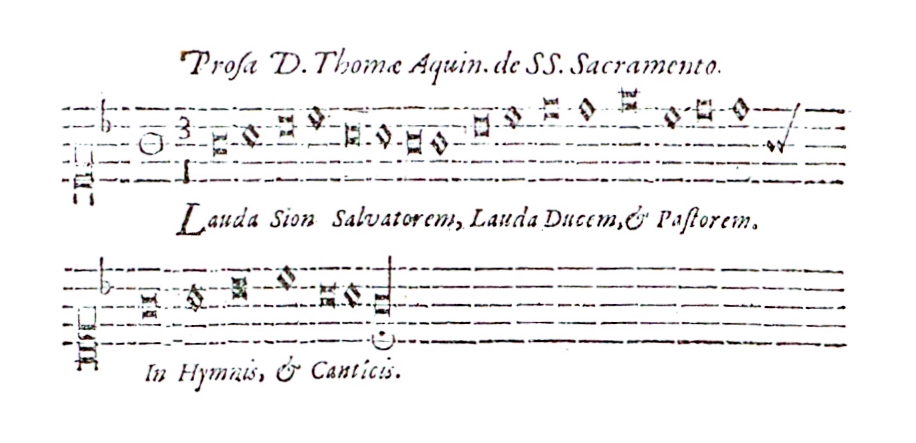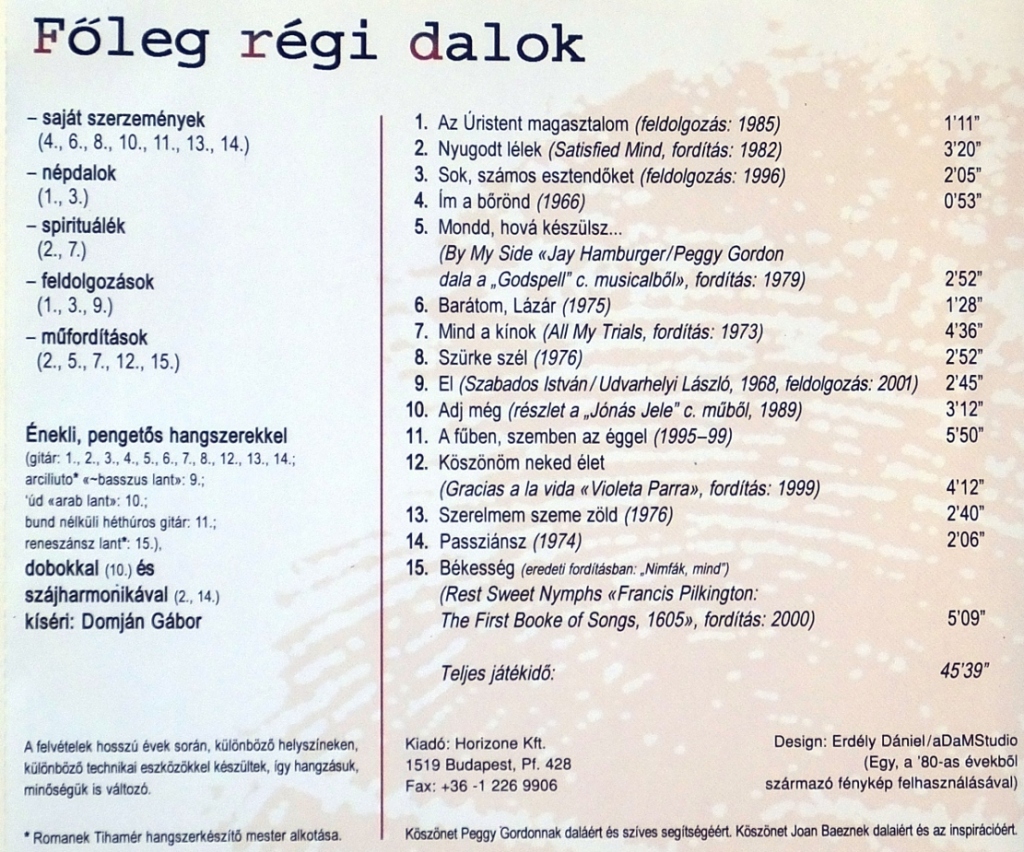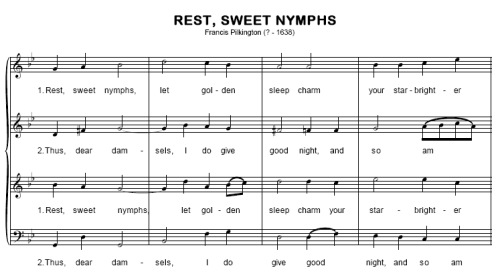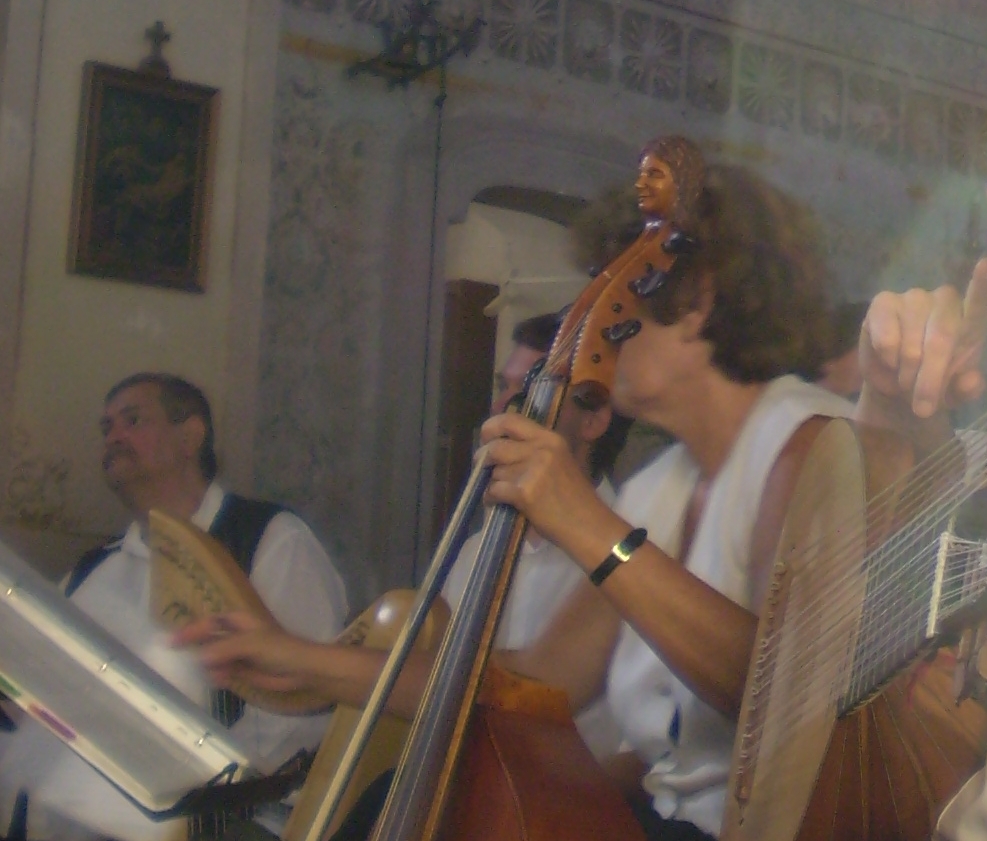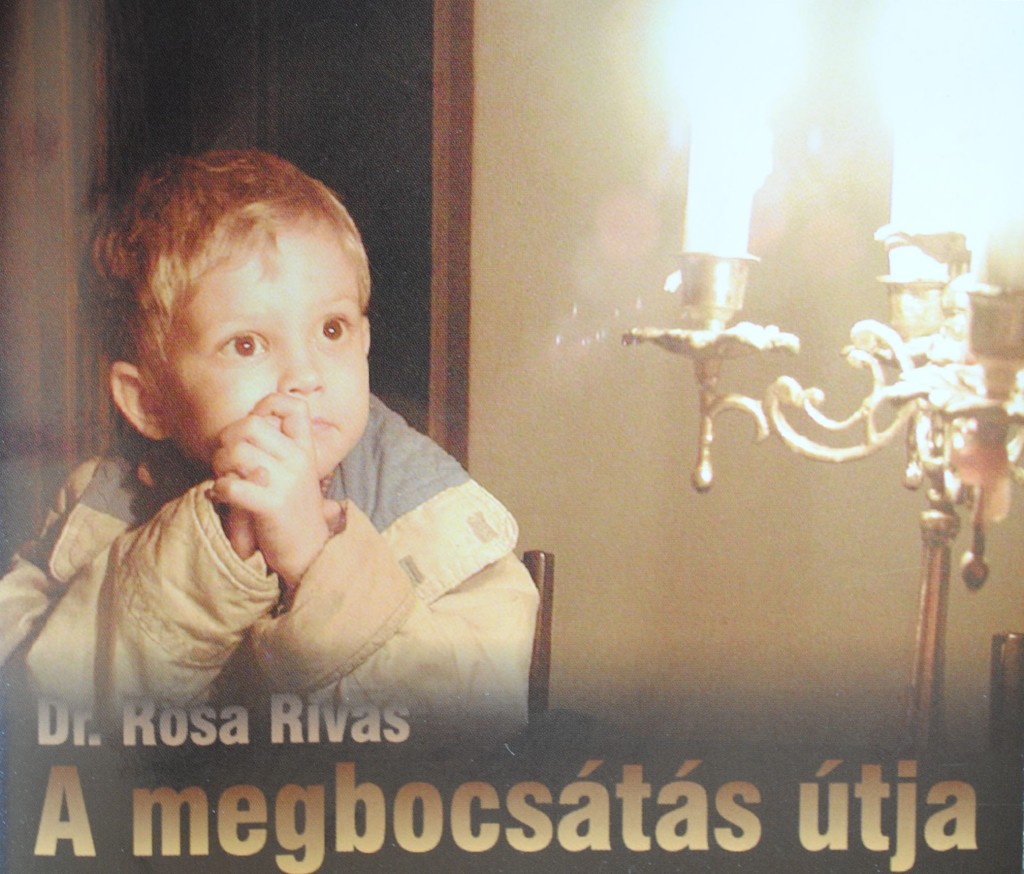Until more recent recordings will be made here is a home made family recording and three other ones from previously published CD-s (”Főleg régi dalok” <Mainly old songs> and “A megbocsátás útja” <The way to forgive>, publisher: Horizone Kft , H-1519 Budapest Pf 428)
Lauda Sion
Saint Thomas Aquinas: Lauda Sion
Lauda Sion Salvatorem
Lauda ducem et pastorem
In hymnis et canticis.
Quantum potes, tantum aude:
Quia major omni laude,
Nec laudare sufficis.
…
Quod in cœna Christus gessit,
Faciendum hoc expressit
In sui memoriam.
…
Dogma datur Christianis,
Quod in carnem transit panis,
Et vinum in sanguinem.
…
Bone pastor, panis vere,
Jesu, nostri miserere:
…
In terra viventium.
Dicsérd Sion megváltódat,
Vezéredet, pásztorodat,
Víg szívvel és énekkel!
Amint lehet, úgy tiszteljed,
Mert alacsonyb minden ügyed,
Nem érsz tiszteletivel.
…
Amit Urunk cselekedett,
Mi is cselekedjünk – intett -,
Szent emlékezetire.
…
Az híveknek hit adatik,
Hogy a kenyér testté válik
S a bor Krisztus vérévé.
…
Te jó pásztor, bizony étkünk,
Jézus, légy kegyelmességünk
…
Az élőknek földében!
Sion, lift up thy voice and sing:
Praise thy Savior and thy King,
Praise with hymns thy shepherd true.
All thou canst, do thou endeavour:
Yet thy praise can equal never
Such as merits thy great King.
…
His own act, at supper seated
Christ ordain’d to be repeated
In His memory divine;
…
Hear, what holy Church maintaineth,
That the bread its substance changeth
Into Flesh, the wine to Blood.
…
Jesu, shepherd of the sheep:
Thou thy flock in safety keep,
…
Fill us with celestial grace.
Hungarian text: János Kájoni (1719),
antecedents: Benedek Kisdi,
Cantus Catholici (1651) and/or
Mátyás Hajnal SJ (1578-1614)
.
English translation:
James Ambrose
Dominic Aylward OP (1813-1872)
8 chorus renaissance lute
copy built by Tihamer Romanek in 1998. The original instrument: Hans Frei, 1530 (Wien, KHM C34).
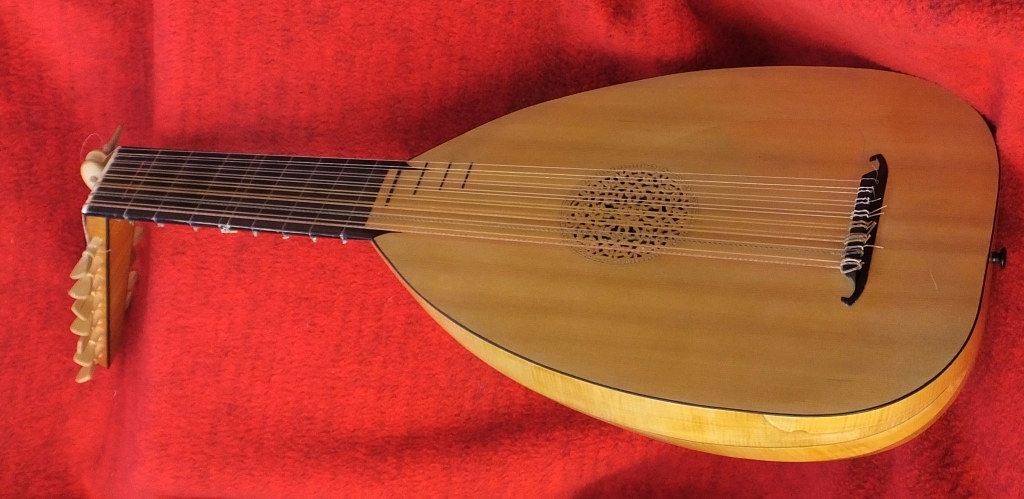
We heard this version of St. Thomas of Aquino’s Lauda Sion in a summer camp with the choir we were members of. It was reconstructed and recorded by memory around 1999. Participants: Ibolya Domján (14), Sebestyén or Attila Domján (both 9 – they don’t remeber either which one of them) and Dénes Domján (7).
EL (István Szabados / László Udvarhelyi, arrangement: GD)
El
Lángos rét, epedőn,
Hogy rajta keresztülmentünk,
Farkasokon nemrég,
Emlékszel arra a helyre?
Bölcs koronád a földre
Lehullni akarván,
Lassan fogtad a fellegeket,
S fogták a felhők fejed.
Tipródott alant a kavics,
Bár könnyűek voltunk ketten,
Hozományul e dísz maradt,
Mely nyomni se tudja fejed.
Bár nem voltál több, min én, a bolond,
Mégis téged néz a világ,
Engem a nép se vidít.
Tudtam már, pedig bizton
Még te se sejthetted,
Hogy ott egy bolond király
És egy király-bolond ment.
Köszöntelek nagy király!
Off
Field of flames, longing,
as we were crossing it
On wolves. Not long ago.
Do you remember that place?
Your wise crown
willing to fall on the ground,
you were reaching out slowly to hold the clouds
And the clouds were holding your head.
The pebbles were trodden below
though even the two of us were way too light.
For dowry, only this decoration remained
That can’t even push your head.
Though you weren’t more than me the fool
All the world is watching you.
Not even the crowd cheers me.
I knew though even you
couldn’t have surmised it yet
that there were the two of us: – a fool king
and a king-fool – passing by.
I greet you great king.
.
Udvarhelyi László verse (1968)
Poem by László Udvarhelyi (1968)
(non-literary, verbatim translation)
ARCHLUTE
copy built by Tihamer Romanek in 1999. The original instrument: Wendelin Tieffenbrucker (1551-1611, Padua), Brussels (M.I. No 1563).
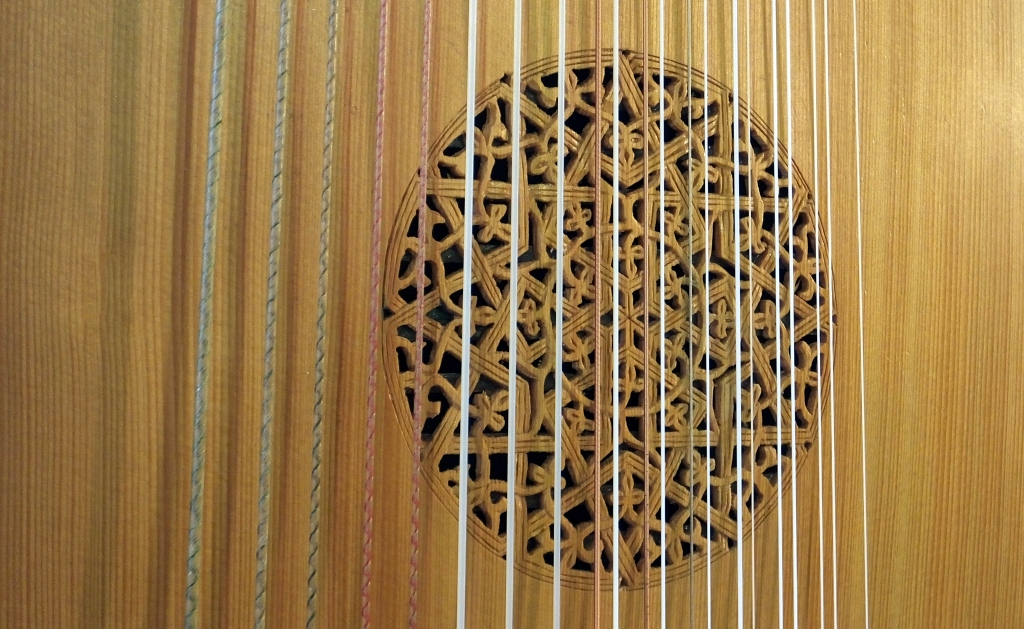
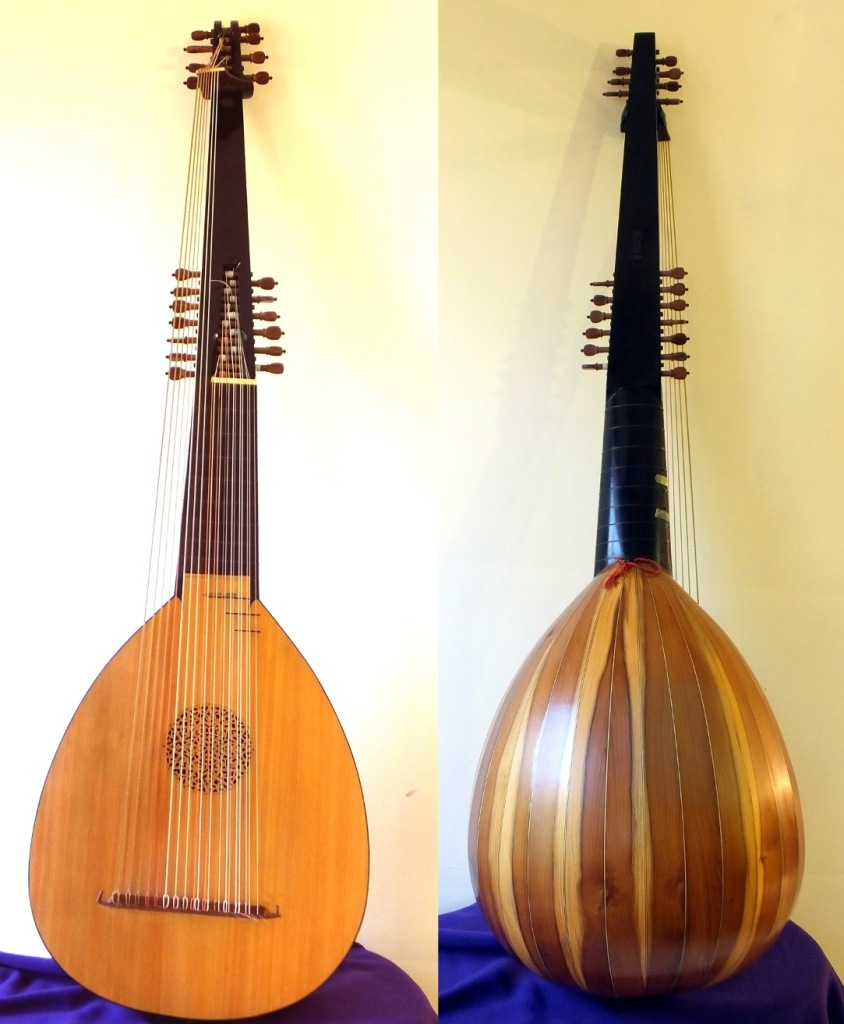
This piece was done by my friends whom I used to play together with in our band when we were in our teens. It was set to lute after about 30-40 years.
Rest Sweet Nymphs, Francis Pilkington, 1605.
Rest sweet nymphs let golden sleep,
Charm your star-brighter eyes,
Whilst my lute the watch does keep
With pleasing sympathies.
Lulla Lullaby, lulla lullaby,
Sleep sweetly, sleep sweetly,
Let nothing affright ye,
In calm contentments lie.
Dream fair virgins of delight,
And blest Elysian groves:
Whiles the wand’ring shades of night,
Resemble your true loves.
Lulla Lullaby, lulla lullaby,
Your kisses, your blisses,
Send them by your wishes,
Although they be not nigh.
Thus dear damsels I do give
Goodnight and so am gone:
With your hearts’ desires long live
Still joy, and never moan.
Lulla Lullaby, lulla lullaby,
Hath pleas’d you, and eas’d you,
And sweet slumber seiz’d you,
And now to bed I hie.
Francis Pilkington: Rest Sweet Nymphs
(The Firts Booke of Songs, 1605)
Nimfák mind, nyugtassa éj
Szemfény-csillagotok!
Lám a lantom lágyan zeng,
Sok húrja halkan bong.
Csíjja, csíjja már, csíjja, álom száll,
Szép álom, szép álom,
Hát semmi se bántson,
Ládd, édes nyugvás vár.
Boldogság szép szűzei,
Hív túlról dús liget,
Szívetek hű hívei
Lehelik langy legét.
Csíjja, csíjja már, csíjja, álom jár:
A csókkal az óhaj
Őt hozza a sóhaj,
Ám légyen távol bár.
Drága hölgyek, mondok ím
Jó éjt, már búcsúzom.
Bár kerülne minket kín
És élnénk boldogan.
Csíjja, csíjja már, csíjja, álom száll:
Éj árnyon, lágy szárnyon
Elringat az álom,
Ládd, nyugszom én is már.
Hungarian translation by Gábor Domján
8 chorus renaissance lute
copy built by Tihamer Romanek in 1998. The original instrument: Hans Frei, 1530 (Wien, KHM C34).

Music for a While, Henry Purcell / John Dryden
Music for a while
Shall all your cares beguile
Shall all, all all,
Shall al your cares beguile
Wondering, wondering
How your pains were eased
Eased, eased,
And disdaining to be pleased
Till Alecto free the dead
Till Alecto free the dead
From their eternal
From their eternal band
Till the snakes
Drop, drop, drop
From her head
And the whip,
And the whip from out her hand
Music for a while
Shall all your cares beguile
Shall all, all all,
Shall al your cares beguile
All all, all all,
Shall al your cares beguile
John Dryden
Áldott zeneszó,
Hogy rossz helyébe jönne jó,
Hogy mind, mind, mind,
Hogy oltaná kínod, mind.
És nem érted, tétovázva kérded:
– Vajh, hová is tűnt, hogy szűnt,
Tűnt, szűnt,
A sajgó kín mitől enyhült?
Ládd a bosszú démona,
A gyilkos fúria,
Hatalma bármíly szörnyű nagy volt,
Véget ér, s újra él mind, mi holt.
S porba hull,
Hull, hull, hull
Kígyó-haja.
Földre hull,
szertefoszlik ostora.
Áldott zeneszó,
Hogy rossz helyébe jönne jó,
Hogy mind, mind, mind,
Hogy oltaná kínod, mind.
Bár mind, mind, mind,
Bár oltana minden kínt.
Hungarian translation by Gábor Domján
This song from Henry Purcell’s Oedipus speaks to the soul suffering in Hades. Male contralto and castrato voices were still common in this age.
Participants in the recording are the members of the Kecskés Ensemble :
- Viola da gamba: Anna N. Bartha
- Lute: András L. Kecskés
- Harp: Péter Kecskés
- Archlute, contralto: Gábor Domján
- Continuo: András L. Kecskés

